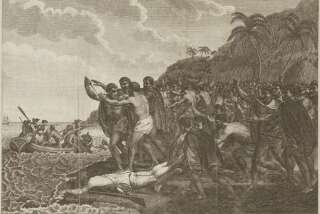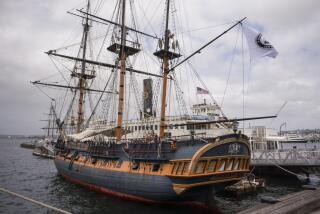WHEN GOD WAS AN ATHEIST SAILOR <i> by Burgess Cogill (W. W. Norton: $17.95; 190 pp.)</i>
- Share via
Burgess Cogill was born at sea in 1902 aboard a five-masted schooner called the Snow & Burgess and captained by her father. In “When God Was an Atheist Sailor,” Cogill sets down her recollections of her first eight years spent at sea, before she and her sister were sent ashore to attend school. Dedicated to her children and grandchildren, Cogill’s poetic stories tell the unique tale of a woman who would remain a child of the sea throughout her life: “It’s not surprising that my whole life is colored with memories of the salt, moist smell and feel of the sea, the breezes that carried us on our way, sometimes mild, sometimes wild, the white-laced foam of blue water in open sea, the constantly changing color of sea and sky. Even as a small child I watched endlessly from the rail the eternal churning, foaming trough of white that followed the ship. We watched it partly because Father watched it but mostly I think because of the scene’s own fascination.”
Hers was a childhood lived by ship’s bells (six knells for breakfast, eight for dinner, two for supper) and filled with exotic playthings and pastimes: “a playhouse in a hempen coil,” storms weathered in a bunk, gooney birds who could be captured and held on deck because the rolling of the ship made them “drunk” and unable to fly. In other ways, however, it was a childhood like any other: “We knew that Santa Claus always managed to find us, no matter what part of the ocean we were on.” If formal schooling was lacking, education was not: The little girl’s mind was filled with the wonder of foreign ports, with learning to read a sextant and learning to tell by the feel of the ship when land was nearby.
As cramped as the quarters were, there was still room for mystery: how sailors bathed, or how the Christmas tree appeared on Christmas Eve. And even in so limited a circle as was offered on shipboard, the captain’s Victorian wife saw to it that the girls were not ignorant of the complexities of social convention. Cogill’s father, who from the deck of his great sailing ship held steamers in contempt and could tell in an instant whether a negligent sailor had let the vessel stray a point off course, is the quintessential paternal figure, master of his entire floating world. Ending with the strange story of his death, Cogill’s memoirs are, as much as a gift to her children, a memorial to the man whose strong presence stands boldly outlined against the sea and sky on every page of her remarkable story.


